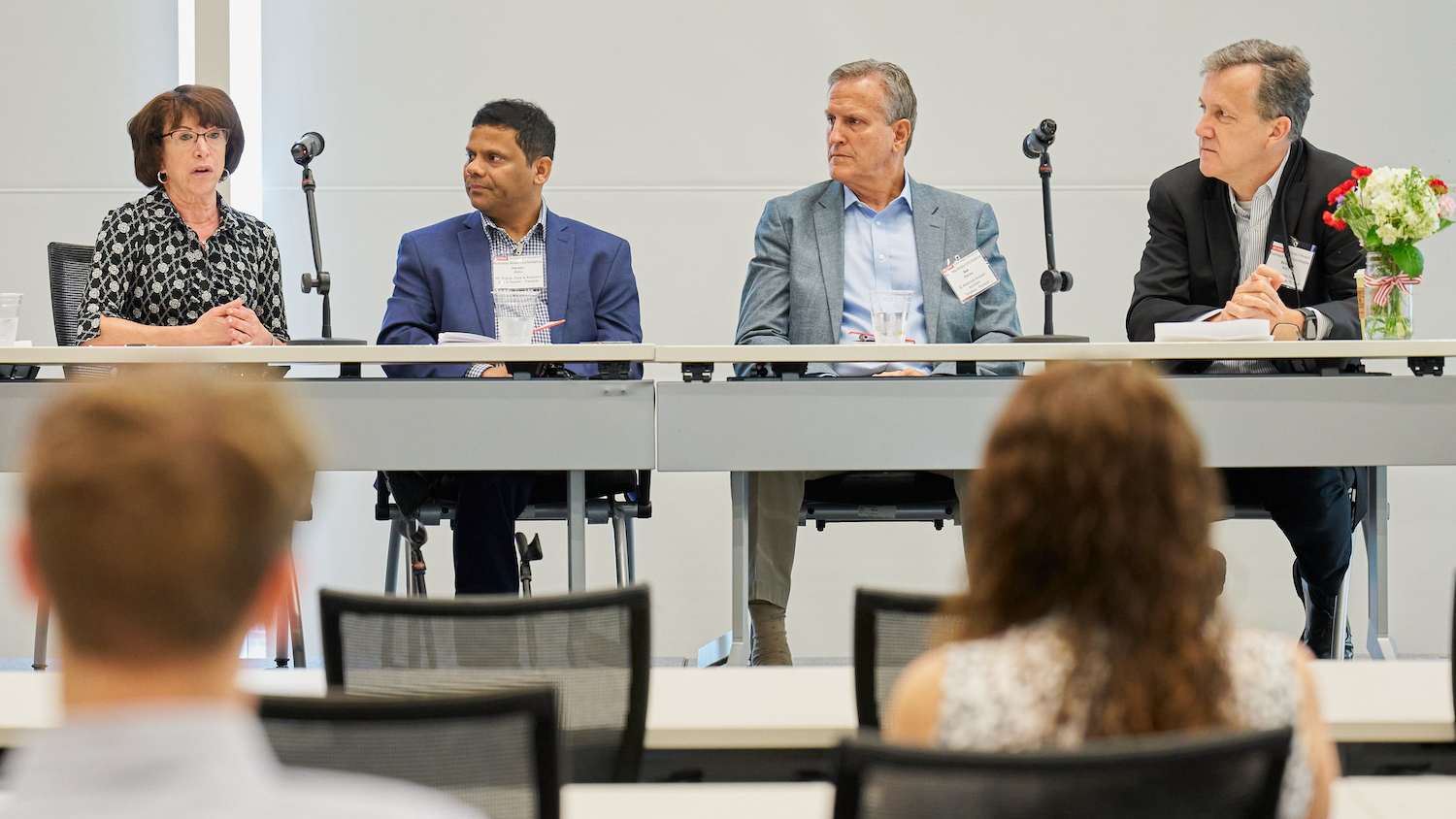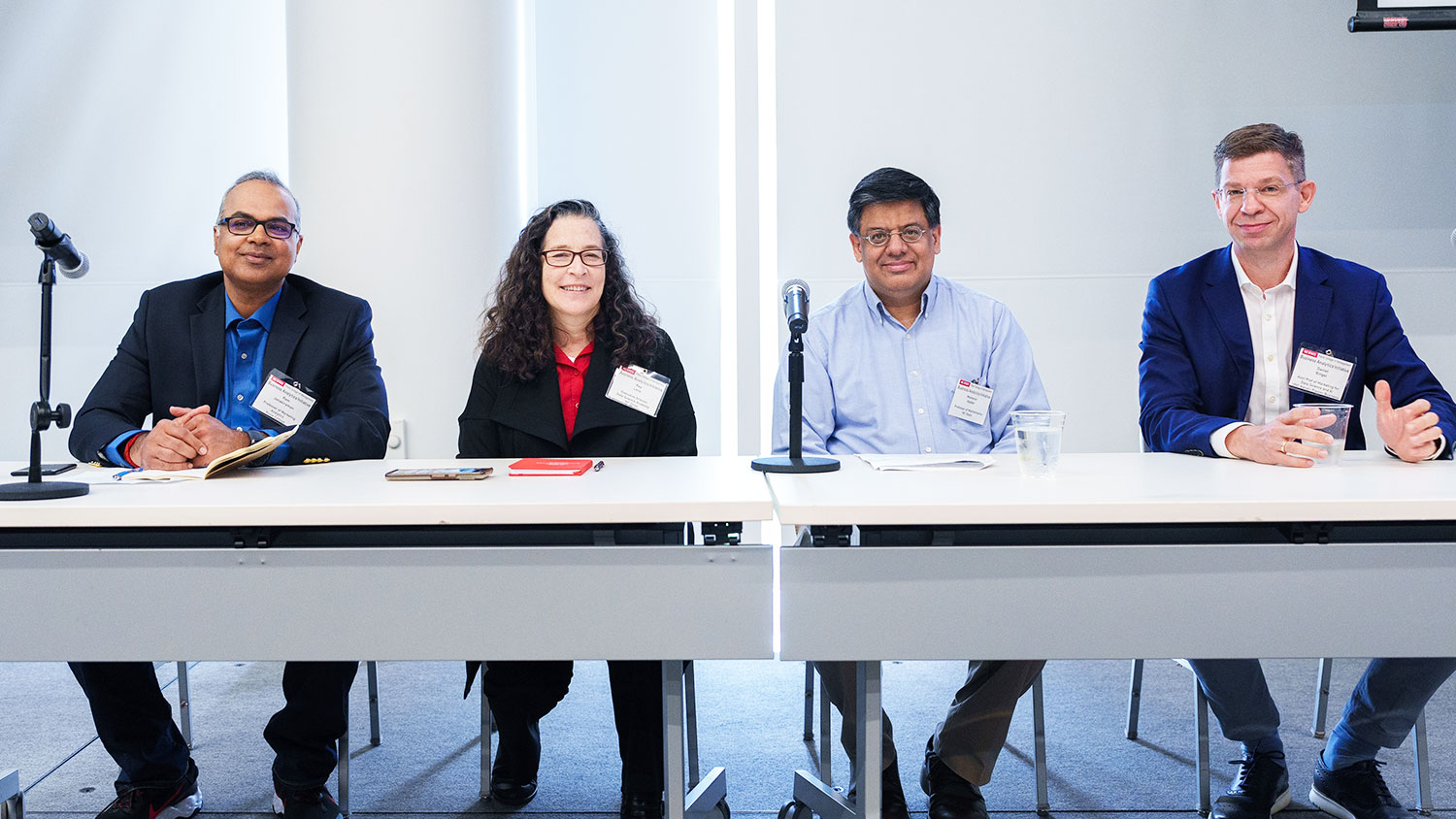BAI Hosts Inaugural Business Analytics Roundtable

By Caroline Barnhill
On Thursday, May 19th, nearly 75 analytics professionals from across the region gathered together at the James B. Hunt Library to participate in the Poole College Business Analytics and AI Initiative’s (BAI) inaugural Business Analytics Roundtable. Featuring thought leaders from academia, firms and organizations working on state-of-the-art analytics, the roundtable gave leaders the opportunity to share how they are tapping into the transformational power of data.
The goal for the event, explained BAI director Kristin Siebenaler, was for experts to share emerging trends in business analytics, generate ideas and create connections for the future. The event included panel discussions on modern approaches to risk and bias and innovation and marketing analytics, as well as plenary sessions on societal analytics, causal inference in social media and communication and analytics.
The conversation around business analytics continues to be a hot topic in C-suites across the globe as companies have more access than ever to data.
“People don’t realize that we’ve generated more data in the last three years than has been generated in the previous 100 years,” said panelist Bob Matsey, senior advanced analytics architect and consultant at Teradata.
“People don’t realize that we’ve generated more data in the last three years than has been generated in the previous 100 years.”
Recognizing data’s potential to solve complex business problems, companies are leveraging sophisticated tools to bring different types of data together and create prescriptive insights in real-time. However, this increasing reliance on data introduces several issues, including ethics, security, algorithmic bias and trust. During the “modern approaches to risk and bias” session, Matsey addressed these issues alongside fellow panelists Ericka Kranitz, director of Poole College of Management’s Master of Management, Risk and Analytics concentration, and Haroon Abbu, vice president of digital, data and analytics at Bell + Howell and BAI advisory board member.
And with unprecedented access to data, the panelists warned that more isn’t always better.
“The key isn’t to get more data, but to know the value of the data,” Kranitz explained. “What data is relevant to the strategic business decision you’re trying to make? What does it tell you and what does it not tell you? Answering these questions helps you be more focused with the data you already have.”
“The key isn’t to get more data, but to know the value of the data.”
In a session on analytics in healthcare, Brad Greenwood, associate professor of information systems and operations management at George Mason University, spoke about the power of data to address a major healthcare crisis – and no, it’s not COVID.
“Medical errors are literally killing us,” Greenwood shared in his presentation opening. “They account for 9.5% deaths in the U.S., which is 28 people an hour. And that number is worse for social outgroups, like black mothers, for example.”
Greenwood continued his talk in speaking about the gender and racial biases in medicine, how to apply a research agenda to it and the role that data analytics and health information technology plays in the process of bridging health disparities.
“However, data helps us create a clearer picture of what’s going on and allows us to challenge several assumptions we didn’t realize we had made. And this isn’t just about medicine – analytics has the opportunity to address these biases in other industries as well,” he shared.
During a lunch session, participants had the opportunity to learn more about supply chain analytics from Rob Hanfield, Poole College Bank of America University Distinguished Professor of Operations and Supply Chain Management and executive director of the college’s Supply Chain Resource Cooperative.
Other event speakers and panelists included Elena Zheleva, assistant professor in computer science at the University of Illinois at Chicago; Jim Pierpoint, senior vice president of global risk management at Bank of America; Rishika Rishika, director of Poole College of Management’s Master of Management, Marketing Analytics concentration; Jeff Sluder, chief financial officer at DXM Inc. and BAI advisory board member; and David Bush, vice president of marketing analytics and data at IBM.
“We were grateful for the opportunity to gather together and learn from some of the brightest minds in business analytics,” says Bill Rand, BAI executive director. “One of our main goals in launching the BAI was to provide global thought leadership to the industry, as well as a forum to discuss their analytics challenges with one another. This Roundtable was a great opportunity to engage in meaningful conversations around some very complex issues.”
- Categories:
- Series:


